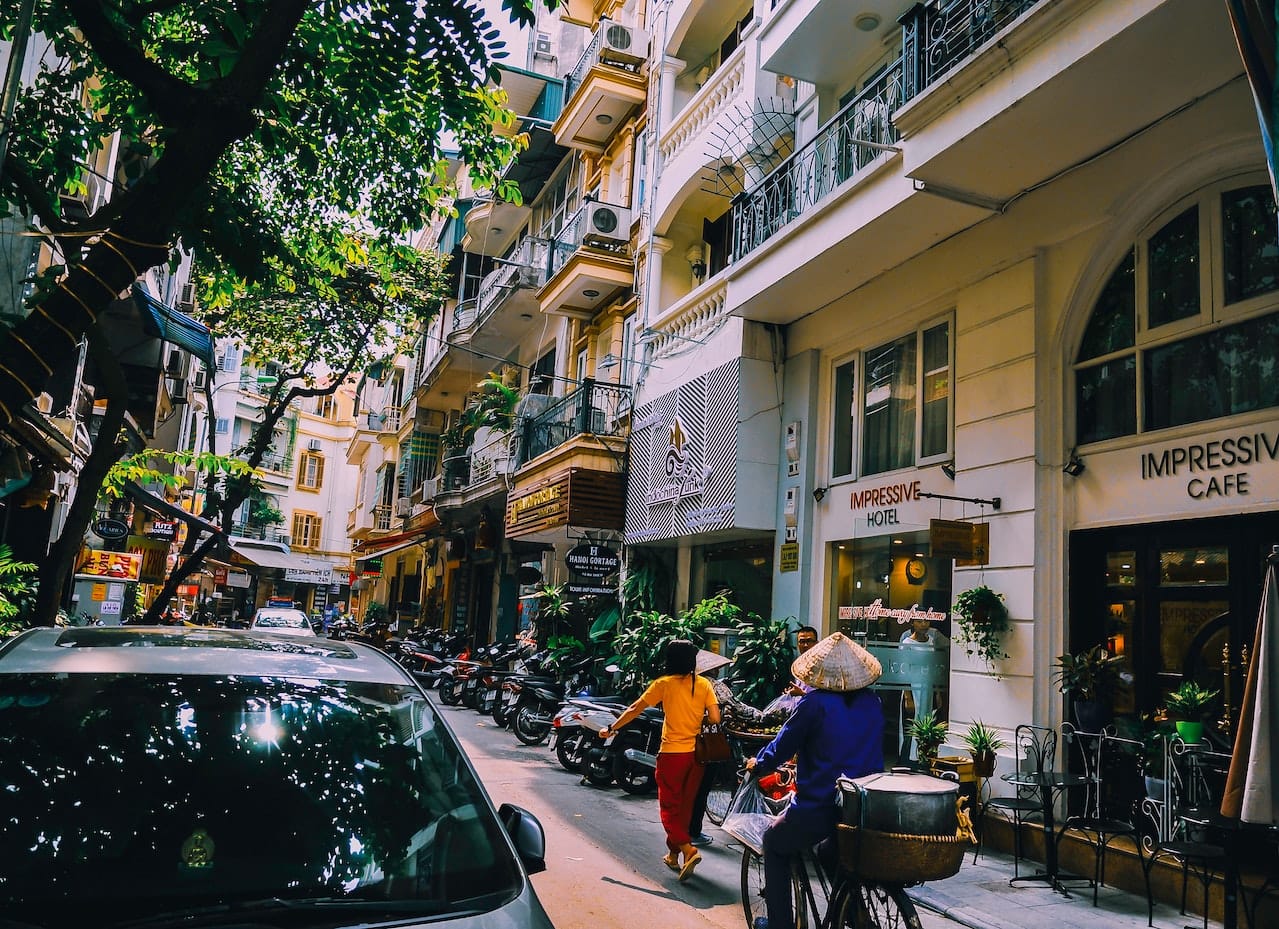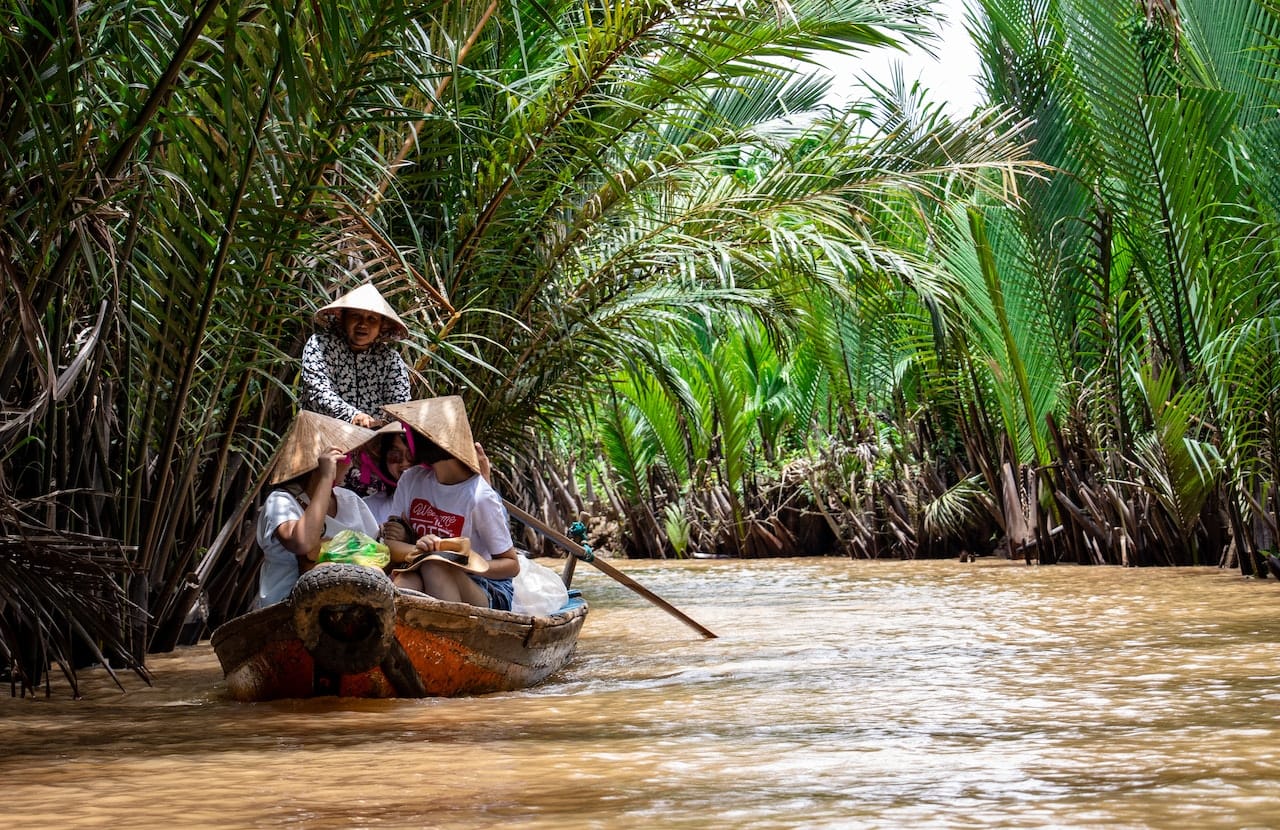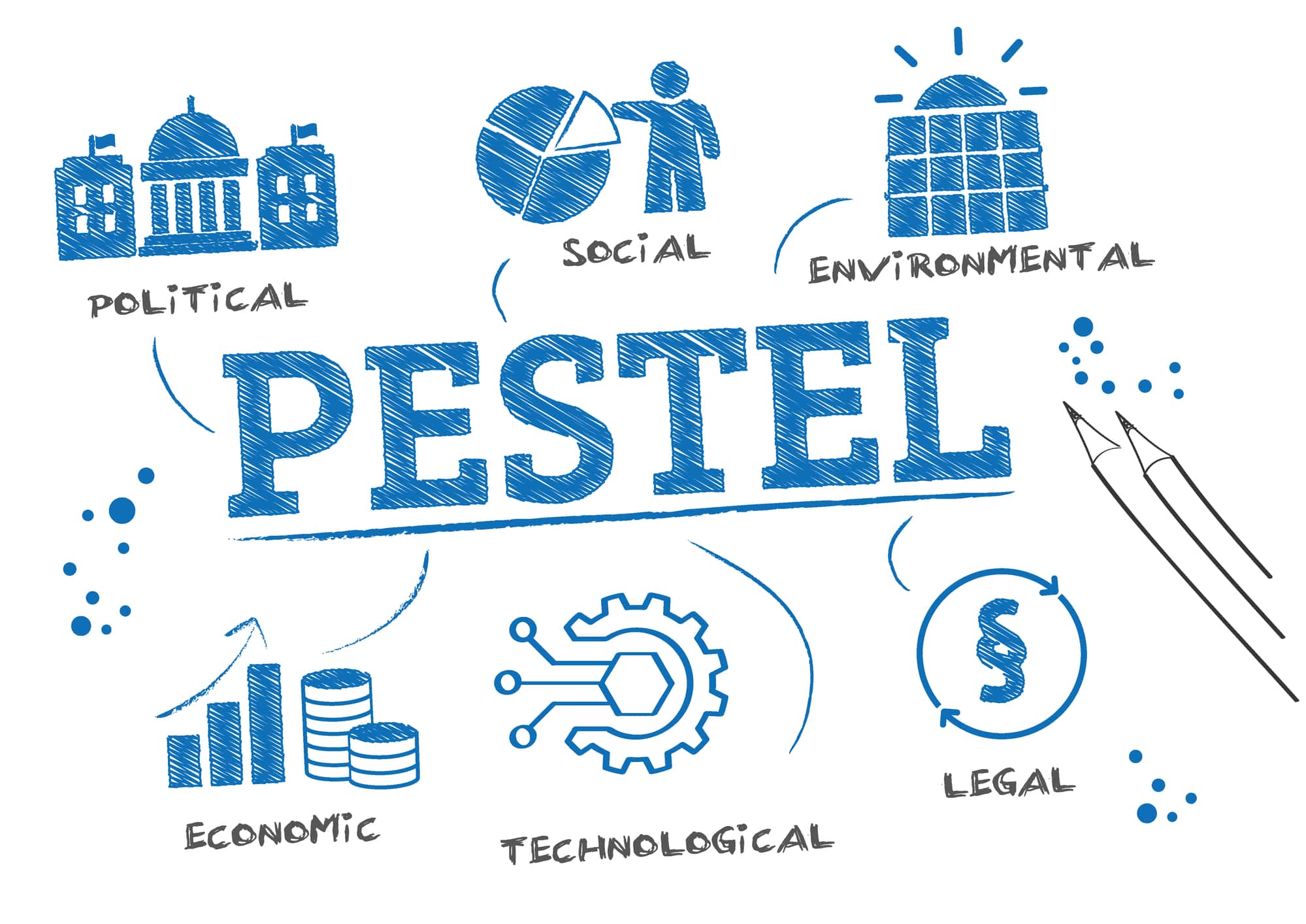Our Vietnam PESTLE Analysis unveils the opportunities and challenges that await investors and businesses in Vietnam, by identifying the affecting factors.
You might have heard about this country in the context of wars and civil interest. However, there is definitely a lot more to this beautiful and resilient land of opportunity.
Businesses have recently realized the potential of Vietnam and decided to move their operations there to make the most out of the natural resources, labor, and other incentives that this country provides.
Investing in Vietnam may seem attractive to businesses. However, before making any investment decision, investors must analyze how external factors impact a business in certain economies.
You must be thinking, what is the way to analyze the external factors that impact the businesses operating in Vietnam? Well, for that, today we will conduct the Vietnam PESTLE Analysis. So, buckle up and get ready to discover the opportunities and challenges that await you in Vietnam.

Vietnam History
Vietnam is located in Southeast Asia, bordered by China to the north, Laos to the northwest, and Cambodia to the southwest. The history of Vietnam dates back over 4,000 years, with the earliest evidence of human civilization found in the Red River Delta region.
From the 2nd century BC, Vietnam was ruled by a series of Chinese dynasties until the Vietnamese achieved independence in the 10th century AD under the Ly dynasty.
This period saw the emergence of Buddhism and Confucianism in Vietnam and the development of a distinct Vietnamese culture and identity.
In the 16th century, Vietnam came under the rule of the Nguyen dynasty, which expanded the country's territory and built a strong centralized government. However, in the 19th century, Vietnam was colonized by the French, who imposed their culture and language on the Vietnamese people.
During World War II, Japan invaded Vietnam and used it as a base to attack neighboring countries. After Japan's defeat in 1945, Vietnamese nationalist Ho Chi Minh declared independence, leading to conflict between the Vietnamese and French forces.
This culminated in the decisive battle of Dien Bien Phu in 1954, which led to the withdrawal of French troops and the division of Vietnam into North and South.
The Vietnam War began in the 1960s and saw the United States intervene to support the South Vietnamese government. The war lasted for over a decade and caused immense suffering and loss of life.
In 1975, North Vietnam captured Saigon, the capital of South Vietnam, and the country was reunited under communist rule.
Since the end of the Vietnam War, Vietnam has undergone significant economic and social development, with the government implementing market-oriented reforms and attracting foreign investment.
Today, Vietnam is a dynamic and rapidly developing country with a traditional cultural heritage and a growing economy.
As the world has evolved as a global village, investors have realized the potential of Vietnam and are keen to do business there. Now that we have discussed the history of Vietnam let's talk about the significance of PEST analysis.
PESTLE analysis is a technique that helps businesses in assessing the external factors that impact businesses in different ways.
Today we are conducting a Vietnam PESTLE analysis which will help us to see how different political, social, technological, legal, economic, and environmental effects in Vietnam impact businesses.
Now that you guys are aware of what PESTLE analysis is and what's the purpose of conducting it, let's proceed further and conduct the Vietnam PESTLE Analysis.

Vietnam's Political Factors
Political factors significantly impact businesses since they significantly shape the country's economy and business environment.
Political Stability and Challenges
Vietnam is a one-party state where the Communist Party of Vietnam holds a monopoly on political power. This has helped Vietnam experience relative political stability over the past few decades, which has attracted foreign investment and stimulated economic growth.
However, the country's political system is not without challenges, including issues related to corruption, bureaucracy, and authoritarianism.
Relationship with Neighboring Countries
Another important political factor in Vietnam is its relationship with its neighboring countries, particularly China. Vietnam has a long history of tension and conflict with China, including territorial disputes in the South China Sea.
This can create political uncertainty and instability, impacting businesses operating in Vietnam.
Government Policies and Regulations
Besides that, the government's policies and regulations are also significant political factors in Vietnam.
The government has implemented numerous policies and initiatives to promote economic growth and development, including tax incentives, investment promotion, and infrastructure development.
The government's policies related to foreign investment are another essential political factor in Vietnam. The government has implemented numerous policies to attract foreign investment, including tax breaks, streamlined procedures, and infrastructure development.
However, foreign investors must navigate a complex regulatory environment, and there is a risk of regulatory changes that could impact their investments.

Vietnam's Economic Factors
Economic factors are one of the most important components of a Vietnam PESTLE analysis. The Vietnamese economy has undergone significant changes in recent years, transitioning from a centrally planned economy to a more market-oriented system.
Rapid GDP Growth
Vietnam's GDP has been growing rapidly over the past few years, making it one of the fastest-growing economies in Southeast Asia.
In 2022, Vietnam's GDP grew by almost 8%, higher than the regional average. Several factors, including foreign investment, exports, and domestic consumption have driven this growth.
Trade Agreements
Moreover, Vietnam is a member of several regional and international trade agreements, including the CPTPP and the RCEP.
These agreements have lowered trade barriers and created new business opportunities to expand into new markets.
Growing Consumer Market
Besides that, Vietnam has a large and growing consumer market driven by rising incomes and urbanization. As the country's middle class expands, there is a growing demand for high-quality goods and services.
This creates opportunities for businesses that can meet these demands and adapt to changing consumer preferences.
Attractive Labor Costs
Another incentive Vietnam has is a relatively low labor cost compared to other countries in the region. This makes it an attractive destination for manufacturing and outsourcing.
However, labor productivity in Vietnam is still lower than in some other countries, which can impact the competitiveness of Vietnamese businesses.
Export Growth
A 14.5% increase in exports and a 10.9% rise in industrial production in the first half of 2024 highlight strong external demand and industrial activity, reinforcing Vietnam's position as a significant exporter.

Social Factors That Affect Vietnam
Social factors are an essential consideration when conducting a Vietnam PESTLE analysis. Social factors refer to the cultural, demographic, and societal trends that can impact businesses operating in a particular country.
Growing Population
One important social factor is Vietnam's rapidly growing population. The country has a population of over 97 million, which is expected to grow in the coming years.
This creates both opportunities and challenges for businesses. On the one hand, a growing population can create new markets for goods and services. But, on the other hand, it can also lead to increased competition for resources and talent.
Cultural Values and Traditions
Another important social factor in Vietnam is the country's cultural values and traditions. Vietnam has a rich cultural heritage. Cultural values such as respect for elders and social harmony continue to play an important role in Vietnamese society.
These values can impact business practices, such as how businesses interact with customers and employees.
Diversity
Vietnam is also a diverse country, with numerous ethnic groups and languages.
This diversity can impact businesses, particularly those operating in rural areas where ethnic groups may have different customs and traditions.
Education System
The education system in Vietnam is another important social factor that businesses need to consider. Vietnam has made significant investments in education in recent years and has a relatively high literacy rate.
However, the education system still faces challenges, including a shortage of qualified teachers and a focus on rote learning rather than critical thinking and creativity.

Technological Factors That Affect Vietnam
In this section, we will discuss some key technological factors businesses need to consider when operating in Vietnam.
Investment in Technology Industry
Vietnam has made significant investments in developing its technology industry in recent years. The government has launched different initiatives to promote innovation and entrepreneurship, including the National Innovation Center and the Vietnam Silicon Valley project.
These initiatives aim to create a favorable environment for technology startups and attract foreign investment in the technology sector. Besides that, Vietnam has a strong manufacturing industry, particularly in the electronics sector.
Strong Manufacturing Sector
This has created opportunities for businesses to develop and integrate new technologies, such as automation and robotics, into their manufacturing processes.
These technologies can improve productivity and efficiency in manufacturing, reducing costs and improving product quality.
Digital Population
Vietnam has a large and growing digital population, with a high internet penetration rate and smartphone ownership. This has created opportunities for businesses to develop digital products and services, such as eCommerce platforms and mobile applications.
As the country's middle class continues to grow and adopt new technologies, there is a growing demand for digital solutions that can improve convenience and efficiency in daily life.

Legal Factors That Affect Vietnam
Businesses are greatly impacted by the legal framework and laws of the country where they operate. This section will discuss what legal factors impact businesses in Vietnam.
Improved Legal System
Vietnam has significantly improved its legal system in recent years, particularly in areas such as investment and business regulation.
The country has signed several trade agreements, such as the CPTPP and EVFTA, which provide a framework for investment and trade between Vietnam and other countries.
These agreements aim to reduce trade barriers and create a more favorable business environment for foreign investors.
Influence of the Communist Party
Besides that, Vietnam's legal system is heavily influenced by the country's Communist Party, which holds significant power in the government and the courts.
This can create uncertainties for businesses, particularly in government or state-owned enterprises disputes.
Complex and Changing Regulations
There is also a lack of transparency in the legal system, making it difficult for businesses to navigate the legal environment.
Vietnam has complex and rapidly changing regulatory policies, particularly in industries such as healthcare and technology.
Businesses must stay up-to-date with regulations and licensing requirements changes and be prepared to adapt their operations accordingly.

Environmental Factors That Affect Vietnam
Environmental factors refer to the natural resources, climate change, weather, and other ecological factors that can impact the country's economic, social, and political landscape.
Rich Biodiversity and Natural Resources
Vietnam is home to a rich biodiversity and an abundance of natural resources. However, the country faces various environmental challenges, including deforestation, air and water pollution.
The rapid pace of economic development has strained the environment. Vietnam is working to balance economic growth with environmental sustainability.
Climate Change Vulnerability
Moreover, Vietnam is one of the most vulnerable countries in the world to climate change. The country is at risk of more frequent and severe weather events, such as typhoons, flooding, and droughts, which can devastate the economy and society.
The government is working to implement policies and strategies to reduce the impact of climate change, such as investing in renewable energy and reducing greenhouse gas emissions.
Dependence on Natural Resources
Besides that, Vietnam is heavily dependent on natural resources, particularly in the agriculture and forestry sectors. The country is among the world's largest exporters of rice and coffee, and the fisheries sector also plays a significant role in the economy.
However, unsustainable practices such as overfishing and deforestation are putting these resources at risk.
As a result, the government is implementing policies and programs to promote the sustainable use of natural resources and protect the environment.

Vietnam PESTLE Analysis: Final Word
Vietnam is a Southeast Asian country. Most of us have heard about Vietnam but only in terms of wars. However, for the past few decades, Vietnam has focused on economic growth and development, due to which it has evolved miraculously.
Vietnam is now considered a land of opportunities by investors. However, there are various elements that investors must consider before investing in a country.
This Vietnam PESTLE analysis highlights some external factors that impact businesses that operate in Vietnam. Reading this article would have made you aware of the PESTLE analysis framework. If you want to read similar articles, look at some other examples of PESTLE Analysis.


